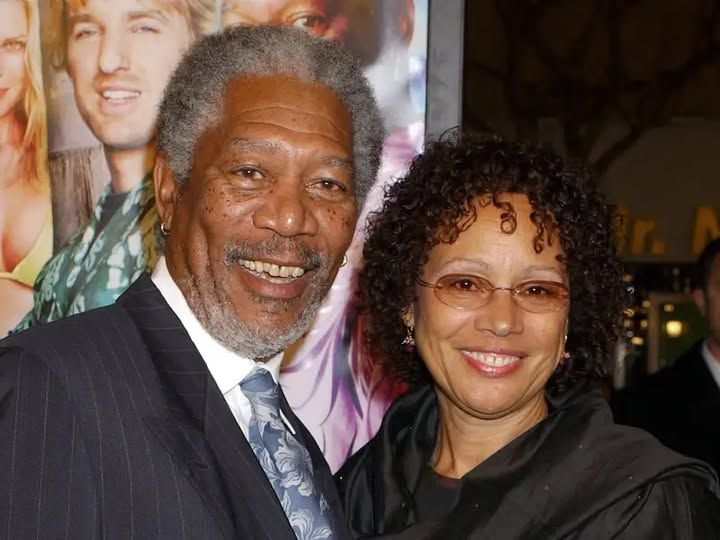In the small town of Greenwood, Mississippi, during the darkest days of racial segregation, a young boy would spend his evenings beneath a weathered tin roof, reading aloud by the faint glow of a kerosene lamp. That boy was none other than Morgan Freeman. Raised by his mother, Mayme Edna—a dedicated schoolteacher—Morgan’s early life was marked by instability. His father, Morgan Porterfield Freeman, a barber struggling with alcoholism, was an intermittent presence. As the youngest of five siblings, Morgan’s family moved frequently, chasing work from Tennessee to Mississippi, then to Chicago, and back again. Though uprooted, these hardships did not defeat him; instead, they molded his character. Fame was never his childhood dream. Survival was his immediate goal, even as he quietly nurtured the powerful voice and commanding presence that would one day captivate audiences worldwide.
Born on June 1, 1937, Morgan Freeman’s first encounter with performance came unexpectedly. At just nine years old, after a school prank landed him in trouble, he was given a role in the school play as punishment. Yet, the moment he stepped onto the stage, something changed. Even as a child, his voice carried a remarkable weight that held the audience’s attention. This early experience ignited a passion that no hardship could extinguish. He continued acting throughout school, eventually winning a statewide drama contest while attending Broad Street High School in Greenwood. Despite being offered a drama scholarship to Jackson State University, he declined, harboring a different ambition—to soar through the skies.
Morgan enlisted in the United States Air Force with hopes of becoming a fighter pilot. However, after years working as a radar technician, he realized that his true path lay elsewhere. Leaving the military, he moved west and enrolled at the Pasadena Playhouse in California to study acting. To support himself, he took on a variety of jobs, including professional dancing in San Francisco and performing in off-Broadway productions in New York. He waited tables and worked odd shifts, relentlessly pursuing auditions and holding tight to his belief in himself. While many contemporaries gave up, Morgan’s journey was just beginning.
Throughout the 1970s, Freeman built his career with stage performances and small television roles, including a spot on the children’s show “The Electric Company.” Though the series offered visibility, it did not fulfill his artistic ambitions. Hollywood struggled to find meaningful roles for a serious Black actor whose presence demanded depth beyond stereotypes. It wasn’t until nearly 50 years old that Freeman’s breakthrough arrived, with his portrayal of the intense pimp Fast Black in “Street Smart” (1987). This role earned him his first Academy Award nomination and opened doors to more significant opportunities.
Following this breakthrough, Freeman’s career flourished with memorable roles in “Glory,” “Driving Miss Daisy,” “Lean on Me,” and the iconic “The Shawshank Redemption.” He became known not just as a leading man, but as a commanding cinematic force who imbued every character with intelligence, quiet strength, and profound humanity. His work continued in films like “Se7en,” “Amistad,” “Bruce Almighty,” and “Million Dollar Baby,” the latter earning him an Oscar. His distinctive, soothing voice became legendary, narrating acclaimed documentaries such as “March of the Penguins” and films like “The Bucket List.”
Behind the scenes, Freeman’s personal life remained largely private. He married Jeanette Adair Bradshaw in 1967, adopting her daughter Deena and having a son, Alfonso. The marriage ended in 1979. In 1984, he married costume designer Myrna Colley-Lee, who played a significant role during a transformative period in his career. He also adopted her daughter from a previous relationship. The couple separated quietly in 2007 and divorced in 2010.
Morgan Freeman is a father to four children: Deena, Alfonso, Saifoulaye, and Morgana. Though he keeps his family life out of the spotlight, he maintains close bonds, especially with his children and grandchildren. In 2015, tragedy struck when his granddaughter E’Dena Hines was tragically killed, a loss that deeply affected him. He rarely spoke publicly about his grief, choosing instead to focus on his work, spirituality, and resilience.
Even as age advanced and after surviving a severe car accident in 2008 that left his left hand permanently paralyzed, Freeman’s dedication never wavered. He continued acting, producing, and lending his voice to projects that inspired him. Recent films include “Angel Has Fallen,” “The Comeback Trail,” and “The Ritual Killer.” Through Revelations Entertainment, the production company he co-founded, Freeman remains committed to telling meaningful stories.
Now in his late eighties, Morgan Freeman stands as a powerful symbol of perseverance. His journey was not defined by overnight success but by decades of steady commitment, quiet faith, and unwavering dignity. The voice that first rose from a humble Mississippi home continues to resonate, inspiring generations across the globe.
